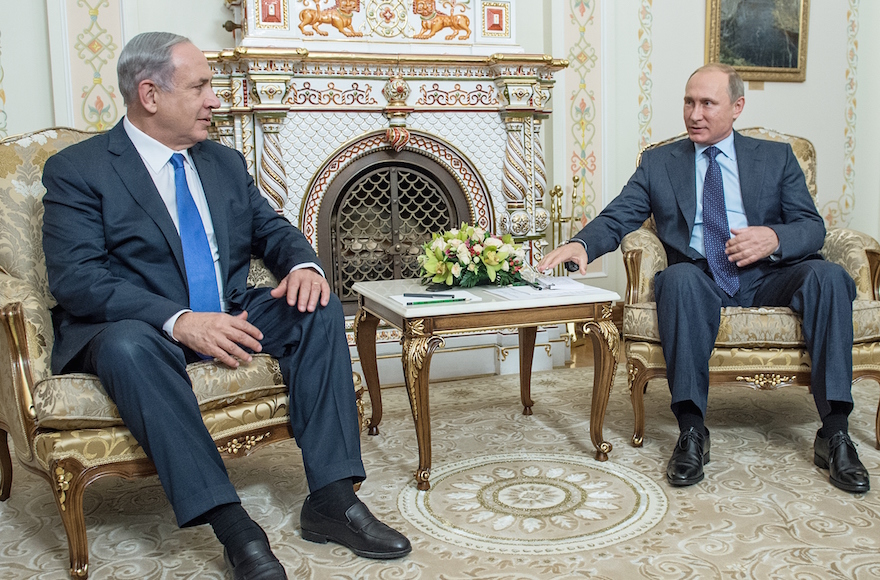Turkey and Russia — long allied against alleged overweening Western interference — have been on the outs since last week, when the Turkish Air Force shot down a Russian warplane that Turkey says crossed into its airspace. Russian fighter jets are targeting enemies of Syria’s Assad regime.
Here are four ways Israel seems to be reacting to the tensions.
1. Schadenfreude
After years of suffering digs from Turkish President Recep Tayyip Erdogan for Israel’s wartime behavior, you’d better believe Israeli Prime Minister Benjamin Netanyahu is seizing the opportunity to depict the Turkish government as reckless and even incompetent.
There’s been a lot of “we’d never do anything this stupid” sentiment in recent official Israeli commentary on the shoot-down. Meeting Monday in Paris with Russian President Vladimir Putin, Netanyahu couldn’t emphasize enough how important it is to communicate — he mentioned Israeli-Russian coordination three times in his brief statement to the media.
“I want to assure you that we believe that it’s within our powers to have very good coordination on the ground and in the air so that we do not create the kind of problems that we’ve been experiencing,” Netanyahu said.
Not blunt enough? Israeli Defense Minister Moshe Yaalon told Israel Radio on Monday: “Russian planes do not intend to attack us, which is why we must not automatically react and shoot them down when an error occurs.”
2. Worry
As fun as it may be to watch Erdogan squirm, the breakdown in Turkey-Russia relations could have some troubling security implications for Israel.
A decade ago, when the George W. Bush administration was contemplating ousting Syrian President Bashar Assad, senior Israeli officials told me they were appalled by the prospect of such an attempt. In their eyes, the two likeliest outcomes were that Assad would be strengthened or that he would fall and be replaced by chaos. It was hard for the officials to decide which would be worse. They said the least likely scenario was the one Bush insiders envisioned: a moderate, pro-Western leader replacing Assad.
The Bush administration, overwhelmed by the post-Iraq War crisis, never moved on Assad. But Assad’s own incompetence helped cripple his regime — for the worse. Israel is facing the very duality it dreaded on its northern border: a failed state packed with Islamist extremist groups, or Iran’s premiere proxies, Assad and Hezbollah, strengthened and hardened by victory.
The best chance for a scenario that brings about an end to the violence but leaves no clear winner is international coordination. Putin, who is helping to prop up Assad, has said he is ready to coordinate, but with Turkey a member of NATO, the Turkey-Russia breakdown could hinder those plans.
3. Sympathy
Turkey and Russia maintain a common interest in Syria: frustrating Kurdish aspirations. Whatever the outcome of the downing of the Russian combat craft, neither side is likely to stop hitting Kurdish targets.
Israel for decades has maintained ties with the Kurds. The affinity is a natural one between two small nations seeking to maintain sovereignty in a sea of mainstream Sunni-Shiite sectarianism. Kurdish Jews in Israel have advocated rescuing their one-time countrymen from peril; the history of Jews and Kurds is not of a dominant sect tolerating a minority, but of brotherhood, they say.
Losses incurred by Kurds on the battlefield will be felt in Jerusalem, not least among the city’s Kurdish Jews.
4. Opportunism
Putin’s government is advising its citizens not to travel to Turkey and has slowed the import of Turkish goods.
Plenty of Russians already vacation in Israel, and there’s always room for more. Might Israel step into that economic breach, at least part of it? Putin, at his meeting with Netanyahu, appeared to hint yes.
“We are satisfied with the progress of bilateral relations. And let me note that the mechanism that has been promoted by you and proposed by you presupposes contacts between the militaries to prevent incidents due to the dramatic developments in the region has been efficient. And we also have advances in other spheres as well,” Putin said.
The Russian president even got in a Hanukkah reference.
“It’s a very good and bright holiday that symbolizes the victory, the triumph of light over dark,” Putin said. “And I really hope that in international affairs we’ll have it this way as well.”
JTA has documented Jewish history in real-time for over a century. Keep our journalism strong by joining us in supporting independent, award-winning reporting.






